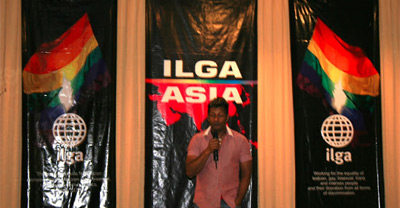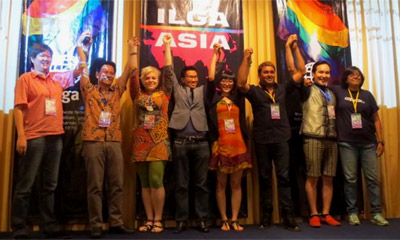Bangkok has always been a gay-friendly city, but last weekend it was a little more homo-fabulous than usual. This was because the City of Angels was playing host to Asia’s biggest ever international conference of LGBT activists: the 5th ILGA Asia Conference.
(ILGA, by the way, is the International Lesbian, Gay, Bisexual, Trans and Intersex Association: a network of over 1,000 activist groups from all over the world. ILGA Asia is just one of its six regional sub-groupings.)

Outgoing ILGA Asia Co-Secretary General Sahran Abeysundara.
Sahran Abeysundara (Equal Ground, Sri Lanka), the outgoing Co-Secretary General, addressed participants at the opening on Good Friday, 29 March, at the Palazzo Hotel. “When we began planning for this conference, we thought we’d have only 80 people show up,” he said.
“Now, we have over 246 people in attendance. We’ve run out of programs, we’ve run out T-shirts, we’ve run out of lanyards. But don’t be angry. This is a reason to celebrate.”
And indeed, there was a sense of celebration in the air that day. Much of this was due to a feeling of triumph, as we gathered together for the first time since the disastrous events of the last conference three years ago.
Readers may remember that the 4th ILGA Asia Conference was to be held in Surabaya, Indonesia, from 26 to 28 March 2010. The event ultimately had to be cancelled when a mob of two dozen men attacked the hotel, rallied together by extremist Muslim groups like the Islamic Defender Front (FPI). All participants and volunteers were evacuated safely, but many activists were left emotionally scarred, unsure if it was worth endangering people’s lives for their cause.
Compare that mood of gloom to the joyous atmosphere of the Bangkok conference, convened with the theme “The Phoenix Rising”, symbolising rebirth and regeneration.
The event opened with a traditional Thai dance performed by a troupe of young men and kathoeys, fused with a lip-synced rendition of the “Amazing Thailand” tourism theme song. All attendees were assured of safety and support for LGBTs by a government official, Dr Taejing Siripanich, Commissioner of the National Human Rights Commission of Thailand.
This was followed by three bewildering days of workshops on gay marriage movements, transphobia and United Nations human rights mechanisms, punctuated with unofficial excursions to Silom and Chatuchak Weekend Market. Finally, on Easter Sunday, a new ILGA Asia Board was voted in – the first new regional board since the 3rd Conference in Chiang Mai, 2008.

From left to right: Poedjiati Tan aka Poedji (Indonesia, SEA female) ,
King Oey (Indonesia, SEA non-female), [Candidate] (W. Asia female),
Kaona Saowakun aka Toto (Thailand, Trans), Dandan Zhang aka Dana
(China, E. Asia female) , Stefan Joachim (Sri Lanka, S. Asia non-female),
Otgonbaatar T. aka Otto (Mongolia, E. Asia non-female),
and Yoghita Singh (India, S. Asia female).
Taking the reins are Dandan Zhang (Chinese Lala Alliance, China) and Otgonbaatar Tsedendemberel (LGBT Centre, Mongolia) representing East Asia; King Oey (Arus Pelangi, Indonesia) and Poedjiati Tan (Gaya Nusantara, Indonesia), Southeast Asia; Stefan Joachim (Equal Ground, Sri Lanka) and Yogita Singh (Sangini, India), South Asia; and a representative from West Asia who wishes to remain anonymous for safety reasons. Additionally, Kaona Saowakun (Thailand) will be serving as the Trans Representative.
The elected Co-Secretary Generals are Dandan and Kaona. They’ll also be representing our region on the ILGA World Board. This is pretty historic news, as Kaona will be the first transman (i.e. female-to-male transgender person) to be a part of this board.
Additionally, Dandan identifies as bisexual. Our two reps will therefore be able to bring fresh perspectives to the international LGBT discussions, voicing the concerns of underrepresented B and T communities from the developing world.
A personal view
Of course, not everyone’s full of praise for the conference. My fellow Fridae writer, Prof Douglas Sanders, confessed that he found the 2008 Chiang Mai conference better put together. This time, he felt the conference seemed to have been organised at the last minute, resulting in a puzzling lack of plenary speakers.
However, even he was delighted by the range of countries represented at the conference. There were delegates present from at least 22 nations, from Bahrain to Vietnam - even a mammoth contingent of 25 activists from Myanmar.
As a blogger and first-time participant in the conference, I was intrigued by how this conference forced me to look at LGBT issues from an international standpoint. For instance, the 377A anti-gay sex law can’t be seen as just a Singaporean issue: it’s also present in various forms in Bangladesh, Brunei, Malaysia, Myanmar and Sri Lanka. The fight for gay marriage is well under way in Taiwan, Thailand and Vietnam, but the struggle’s taking place differently in each country, with different levels of democratic engagement between the government and activists. It’s all quite fascinating.
Yet perhaps the most inspiring thing about the conference is the way alliances are being formed across national boundaries. The queer groups of China, Taiwan and Hong Kong have linked up for activist training and brainstorming, regardless of the rivalries and disputes between their territories. ASEAN activists are especially close-knit: we’ve been drawn together by the shared experience of battling for the emerging ASEAN Intergovernmental Commission on Human Rights (AICHR) to include sexual orientation and gender identity issues.
Before my arrival, I’d questioned the need for this conference. After all, in the age of Skype and Facebook, so much communication can take place virtually. It’s harder to justify spending time and money, booking a flight and a hotel room and to listen to a series of presentations on facts you research on your own.
But, there’s something special about meeting in flesh. As Renato Sabbadini, a Co-Secretary of ILGA World, told me, “If you don’t have a conference every two years, people don’t get the sense of belonging to the same region. [When] people see each other, they feel more committed to each other.”
That’s the vital thing about a conference like this: how it builds a regional community of LGBT activists who can share ideas and concerns, and can support each other in the movement for equal rights and acceptance.
Meanwhile, the 6th ILGA Asia Conference has already been scheduled. It’ll be in the city of Taipei in October 2015, during the festivities of Taiwan Pride. I’m definitely looking forward to attending and meeting more activists from across the region. Perhaps I’ll see a few of you there.
To find out more about the events of ILGA Asia Conference 2013, visit the conference blog at http://ilgatheraisingphoenix.blogspot.com.
ILGA’s official website is http://ilga.org. ILGA Asia’s website is http://ilga.org/ilga/en/organisations/ILGA%20ASIA. If you’re part of an activist group, do consider becoming a member organisation in their network.
